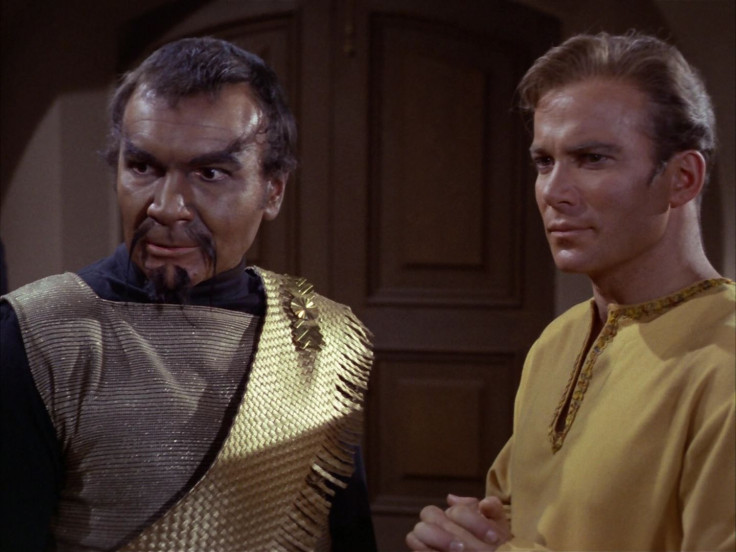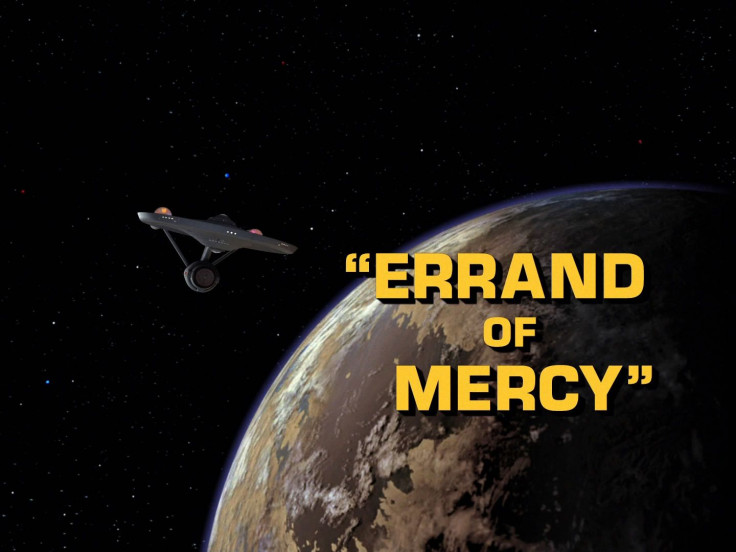As the Sept. 24 premiere of Star Trek: Discovery approaches, Player.One will profile essential episodes to watch for a better understanding of the characters, species and history informing the first Star Trek series in over a decade.
One of the most rewarding arcs in TV and movie history is the evolution of humanity’s relationship with the Klingon Empire over the approximately 230 years of Star Trek history, sprawling over six television series and 13 movies. From tentative allies to bitter enemies and back again, the United Federation of Planets rarely encounters a species more challenging to its utopian values. The upcoming Star Trek: Discovery looks to examine this enduring relationship in more thorough detail than any previous Trek series, tying together years of continuity and the full scope of Klingon society’s 24 warring houses (yes, the Klingons are Game of Thrones). But it all began much more simply, in the Star Trek: Original Series episode “Errand of Mercy.”
Our first introduction to the Klingons serves as a useful summary of the relationship going forward. “Negotiations with the Klingon Empire are on the verge of breaking down,” Kirk tells Spock on the bridge of the Enterprise.
Our understanding of the Klingons is first built from Kirk’s words. “The Klingons are a military dictatorship, war is their way of life,” Kirk tells the pacifist Organians, whose planet is about to fall under Klingon control. “Life under Klingon rule would be very unpleasant.”
To Kirk, Klingon militancy is inevitable. “Klingons will move against you as surely as your sun rises,” he says, to the indifferent Organians. “You’d be far better off on a penal planet. Infinitely better off.” Still, the Organians will not listen and refuse to condone the Federation of Planets establishing their own military bulwark on the planet.
Before the Klingons even appear on-screen, “Errand of Mercy” reveals how their existence distorts humanity, driving us to be crueller to match them. Kirk, increasingly angry with the Organians’ inaction in the face of the Klingon threat, acts more forceful himself. He offers the Organians all of the traditional “benefits” of empire. “We can help you remake your world, end disease, hunger, hardship,” he says, “All we ask in return is that you let us help you. Now.”
In the utopian future of Star Trek, where peace rules over hundreds of worlds and people want for little, it’s very possible Kirk could provide the Organians the benefits he offers, without the oppression and cruelty we associate with the empire infrastructure-building of the British Raj or the United States in the Philippines. Still, the echoes of how we excuse authoritarianism over others are obvious in Kirk’s words. Fear of the enemy has made a good man a little more cruel.
“War. We didn’t want it, but we’ve got it,” Kirk says.
“Curious how often you humans manage to obtain that which you do not want,” Spock replies.

When the Klingons finally show themselves, it’s hard not to be a little disappointed. These aren’t the hulking, wild-haired, ridged-forehead Klingons they’ve since become, but normal men (in unfortunate yellowface, complete with Genghis Khan facial hair). The first Klingon we meet, Kor, is forceful, but urbane. He treasures anger and fear almost academically, delighted to see a look of hatred on Kirk’s face. “Well have we a ram among the sheep?” he asks. “Good, honest hatred. Very refreshing.”
Klingon rule is characteristically brutal, but far more technocratic in “Errand of Mercy” than in later iterations of Trek . These Klingons post snippy little rules everywhere — the punishment is always death. They use “mind ripper” technology to interrogate prisoners, something Worf and the Klingons of The Next Generation would likely find repugnant and cowardly. Kor doesn’t relish the adrenaline of hand-to-hand combat, preferring a chess match of sorts, matching wits with Captain Kirk. “We Klingons have a reputation for ruthlessness, you’ll find it’s well deserved,” Kor says, preferring the rhetorical assertion of cruelty to direct action.
Though the Klingons are far more Federation enemies than allies in Star Trek: The Original Series, “Errand of Mercy” demonstrates how they were used, right from the start, to reveal our own militant impulses. We may not embrace honor culture and death like the Klingons, but we’re unable to think outside of the same war-like mindset as them. The Klingons were never an enemy beneath our contempt, but the enemy humanity deserves.
By the episode’s end, Kirk and Kor are ostensibly at each other’s throats, but sure seem to commiserate a lot over how much they hate the peaceful passivity of the Organians. The Klingons may profess it more, but it’s obvious Kirk also relishes a competition of strength.
And what about the poor Organians, caught in the middle? Turns out they were god-like beings, capable of enforcing pacifism through sheer telekinetic power, with the power to cripple the Klingon and Federation warships orbiting above. Though ostensibly an endorsement of pacifism, as the Organians force Kirk and Kor to abandon direct aggression, it’s telling that screenwriter Gene L. Coon could only imagine pacifism imposed by greater force. It’s hard, maybe even impossible, to work outside of the dynamics of naked power.
Klingons are frequently described as Shakespearean, an apt description evident right from their franchise debut in “Errand of Mercy.” They love grandiloquence and conflict. On a superficial level, there’s an undeniable costume-drama feel to the Klingon’s introduction, with colorful Robin Hood tunics and Kirk spying under the alias ‘Verona.’
The Klingons would become a very different variety of Shakespearean in Star Trek: The Next Generation and Deep Space Nine (which reintroduces a very different Kor). Rather than bureaucratic fusspots crafting nasty retorts and relishing a combat of wits, these Klingons are boisterous, fight-picking drunks — Mark Antony transformed into a mob of Falstaffs.
From what we’ve heard of Star Trek: Discovery, the new show looks to bridge those two interpretations. The Klingons of DSC are far more alien, steeped in mysterious ritual. They have the dignity and sense of purpose Kor demonstrates in “Errand of Mercy.” But the honor culture and violence is also apparent, with the Klingons of Star Trek: Discovery looking more like religious fanatics than ribald wrestlers.
“Errand of Mercy” is an Original Series episode that’s already essential, simply because it’s our first introduction to the Klingons. But what’s most remarkable is that it establishes the exact blend of animosity and begrudging respect that would come to define the relationship between species over the decades. The Klingons may be warlike, but even the peaceful humans of the United Federation of Planets find themselves caught up in similar pursuits of honor, glory, prestige and dignity.
“Errand of Mercy” ends on an astonishing prediction from the Organians, who can see the course laid out before the Klingons and humans. “Oh, eventually you will have peace, but only after millions of people have died,” the Organian leader tells Kor and Kirk. “You and the Klingons will become fast friends. You will work together.” Star Trek: Discovery will be defined by that contrast, superimposing over societies at war the potential for peace we know them to possess.
“Errand of Mercy” is the second in Player.One’s ongoing series of essential episodes to watch before Star Trek: Discovery premieres Sept. 24 on CBS. Also check out our write-up of the rejected Star Trek pilot “The Cage” to read about the inspiration for Sonequa Martin-Green’s Star Trek: Discovery character, Commander Michael Burnham.
More Essential Star Trek Episodes To Watch Before Star Trek: Discovery
Star Trek: The Original Series “The Cage,” model for DSC protagonist Michael Burnham.
Star Trek: The Original Series “Errand of Mercy,” our introduction to the Klingons.
Star Trek: The Original Series “Journey to Babel,” the first Sarek episode.
Star Trek: The Next Generation "Sarek" and the decline and death of Spock's father.
Star Trek: The Animated Series "Yesteryear" reveals what life was like for a young Michael Burnham as a human on the planet Vulcan.
Star Trek: The Next Generation "Lower Decks" explores stories and characters away from the bridge.
Star Trek: The Next Generation “Rightful Heir” resurrects Kahless, the most important Klingon religious figure.
Star Trek VI: The Undiscovered Country, the best-yet depiction of Federation-Klingon relations.
Star Trek: Deep Space Nine “Trials and Tribble-ations” explores the limits of nostalgia.
Star Trek: The Original Series "A Private Little War" takes Kirk, Bones and Spock to Vietnam.



















